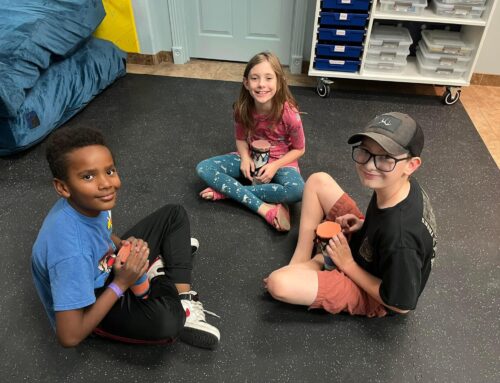Why Is Expressive & Receptive Language Development Important?

Expressive & receptive language skills are crucial for effective communication. If a child consistently struggles to comprehend others or express their thoughts, ideas & emotions, they may have a language disorder. This disorder can manifest as either a receptive or expressive language disorder.
To assess whether your child has receptive or expressive language difficulties, it is essential to distinguish between these two types of language skills.
What Is Receptive Language?
Receptive language, often called the “input” of language, is the remarkable ability to understand & comprehend the spoken language you hear or read. It’s like unlocking the door to communication, allowing you to follow directions effortlessly, such as the simple instruction “Put on your coat.”
In the journey of typical development, children understand language before they can even produce it.
However, for those who struggle to comprehend language, it may indicate difficulties in receptive language or even a receptive language disorder.
Children who find it challenging to grasp language may encounter hurdles in various areas:
- Navigating instructions
- Deciphering the meaning behind gestures
- Responding to inquiries
- Identifying objects & images
- Comprehending written text
- Unravelling the intricacies of a story
Receptive language development is influenced by several key factors, such as language exposure, the quality of the language environment & individual differences in language processing.
Children immersed in a language-rich environment, interacting & engaging in conversations with others, are more likely to develop strong receptive language skills.
This includes exposure to diverse speakers, actively participating in conversations & accessing reading materials.
How To Improve Receptive Language?
Here are several strategies parents can employ to collaborate with their children in enhancing receptive language skills:
1. Books & Audiobooks: Reading is an excellent method for expanding vocabulary & enhancing listening skills. Similarly, listening to audiobooks can help refine auditory processing abilities. Whenever feasible, engage your child by asking follow-up questions about their reading or what they have heard.
2. Listening Games: Engage in interactive listening games like “Simon Says,” “I Spy,” or “Bop It” to enhance your child’s listening skills. These fun activities will effectively develop their ability to listen attentively.
3. Conversations: Encourage your child to actively listen & engage in conversations. Encourage them to listen to others’ speeches, remember important details & ask thoughtful follow-up questions. This will develop their conversational skills & foster deeper connections.
4. Visuals: Enhance spoken language comprehension by incorporating visuals such as images or videos.
5. Gestures & Facial expressions: Use gestures & facial expressions when speaking to illustrate the meaning of words. Point out others’ gestures & facial expressions in pictures to help your child understand their meaning.
6. Daily Opportunities: Utilize everyday routines like meals & car rides to tell stories, engage in conversations & ask your child questions. For children with receptive language difficulties, a consistent routine aids their comprehension of the language in their environment.
If you have concerns about your child’s potential need for extra assistance, speech-language therapy can be extremely effective in enhancing receptive language skills. A skilled speech-language pathologist from Theracare Pediatric Services will employ a range of informal & formal assessments to identify the specific areas where a child may have receptive language challenges.
For every child, a personalized treatment plan is crafted. The objectives encompass various areas such as attention & concentration, vocabulary, grammar comprehension, figurative language, comprehension strategies & the ability to follow directions. The aim is to create a comprehensive approach that ensures optimal progress & development.
Speech therapy for receptive language is tailor-made for each child, addressing their unique needs. Children can actively engage & participate in daily activities with confidence & independence by enhancing their receptive language skills.
What Is Expressive Language?
Expressive language refers to the “output” of communication, encompassing the capacity to convey desires & requirements verbally or nonverbally. It involves articulating thoughts into coherent & grammatically correct words & sentences. Children who struggle to express their needs may experience difficulties with expressive language or have an expressive language disorder.
Identifying expressive language disorders in young children often occurs when they fail to meet their developmental milestones.
Children who experience challenges in language production may encounter difficulties in the following areas:
- Inquiring
- Identifying objects
- Using gestures
- Utilizing facial expressions
- Offering comments
- Expanding vocabulary
- Applying syntax (grammar rules)
- Understanding semantics (word/sentence meaning)
- Grasping morphology (forms of words)
How To Improve Expressive Language?
Here are several strategies for parents to collaborate with their children in enhancing their expressive language abilities:
1. Conversation: Encourage your child to share thoughts, feelings & experiences. Ask open-ended questions that require more than a one-word answer, like “What did you do at school today?”
2. Pretend Play: Engage in Pretend Play with your child using props like dolls, action figures, toy animals & even household items. These creative tools ignite imagination & provide endless possibilities. Encourage your child to share their imaginative world with you by asking them what they envision.
3. Storytelling: Encourage storytelling in your child by asking them to share their imaginative tales or act out stories. If your child struggles, support them in breaking down the timeline & sequencing of events. Children’s narrative language skills progress throughout childhood, producing more intricate & detailed stories as they age.
4. Everyday Opportunities: Incorporate expressive language skill practice into your daily routines, like during meals or car rides. During dinner, engaging in games such as “Highs & lows” can greatly enhance the development of these skills.
5. Descriptions & Details: Ask your child to describe things, events & people. For example, if they tell you about a video, ask specific questions to encourage more detail (e.g., “What did the car look like?”).
6. Speaking Opportunities: Speaking Opportunities: If your child feels at ease, encourage them to address others, including family members. For example, “Would you like to share with Grandpa what transpired at school yesterday?”
If your child requires extra support, speech therapy can address expressive language delays & deficits. Through our expressive language therapy, each child is empowered with the necessary tools & strategies to effectively communicate their needs, thoughts, feelings & ideas to the world. It’s a transformative journey that unlocks their voice & ignites their connection with the world around them.
Reach Out To Theracare Pediatric Services

Theracare Pediatric Services takes pride in its extensive network of highly qualified therapists. Each therapist holds a master’s or doctorate in their field & has significant experience in addressing expressive & receptive language delays & disorders.
Our rigorous selection process ensures we carefully match each child with a therapist with the precise training & experience tailored to their specific needs. This meticulous approach guarantees effective & successful therapy outcomes for every child we serve.
We understand the importance of creating a positive & engaging environment for our young clients. Our outstanding therapists provide an encouraging & supportive atmosphere in which each child feels safe to express themselves.
If you want to learn more about Theracare Pediatric Services’ speech & language therapy, please reach out today. We look forward to helping your little one unlock their voice & discover the power of language. Let us guide you in sharing your child’s story with the world!
Theracare Pediatric Services also offers a comprehensive range of occupational, physical & many other pediatric services. Explore our website to learn more about how we can help your family. Our knowledgeable team is here to answer your questions & offer guidance every step of the way.
Let’s start the journey together! Contact us today to get started!





